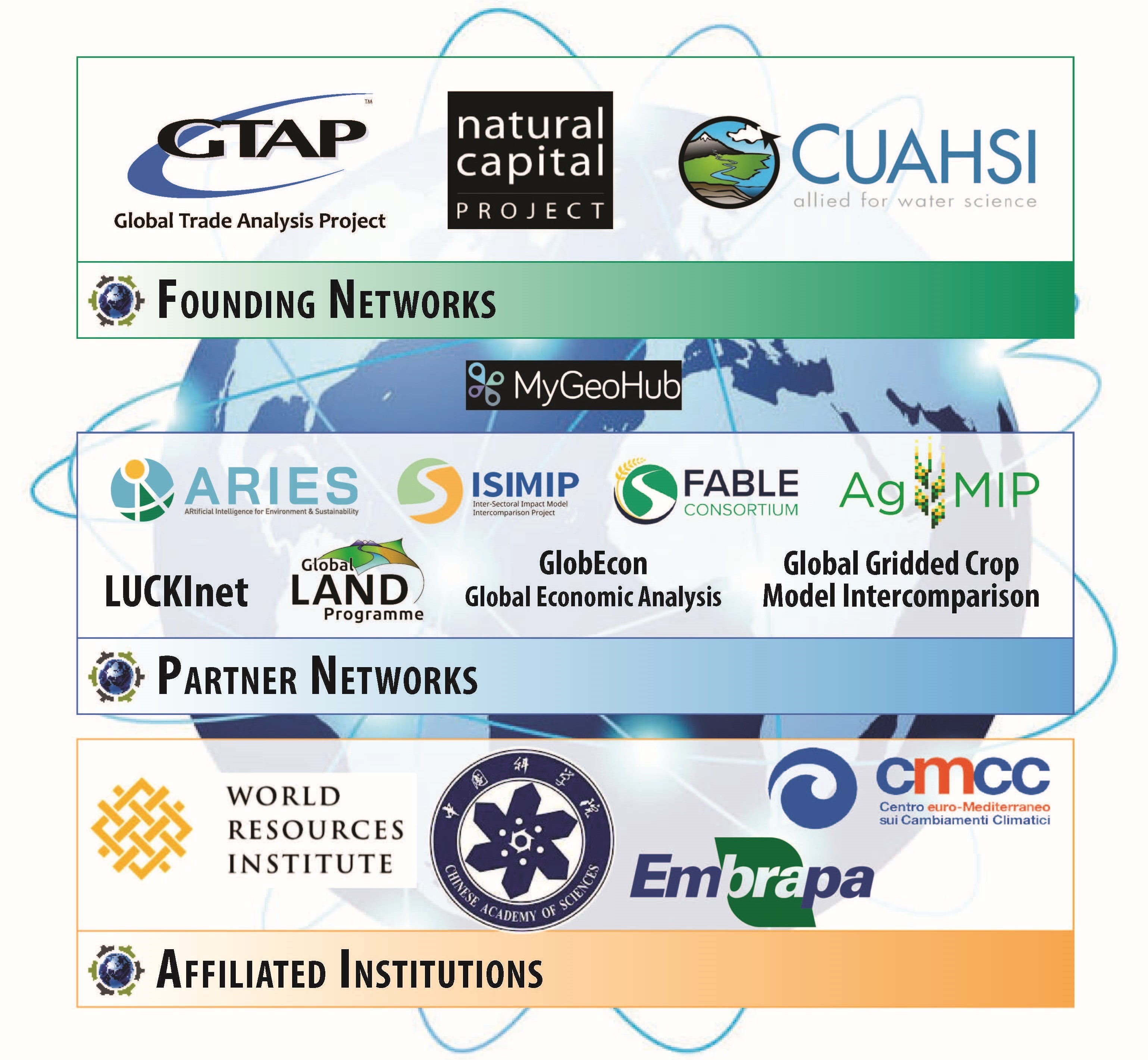Networks
Our partners strengthen the GLASSNET community with complimentary of vision, infrastructure, expertise, models, and data:

Get to know our networks:
U.S. Based Networks:
GLASSNET
GLASSNET builds on the open-source analysis built by the Purdue-based interdisciplinary research team, Global to Local Analysis of System Sustainability (GLASS) initiated in 2016. As ‘GLASS 2.0’ GLASSNET will utilize the NSF-funded Geo-Hub collaboratory to act as a center without walls.
NatCap
NatCap is a partnership aimed to integrate the value nature provides to society into all major decisions. NatCap developed the Integrated Valuation of Environmental Services and Tradeoffs (InVEST) suite of ecosystem service models used to analyze land use decisions and multiple ecosystem services. The NatCap partnership includes the Chinese Academy of Sciences, the University of Minnesota, and the Stockholm Resilience Centre — and the world’s largest environmental NGOs, The Nature Conservancy and World Wildlife Fund.
GTAP
GTAP is a global network of researchers and policy makers conducting quantitative analysis of international policy issues. The GTAP modeling framework assesses the interplay between trade and sustainability.
CUAHSI (Consortium of Universities for the Advancement of Hydrologic Science, Inc.)
CUAHSI is a NSF-supported, 501(c)3 non-profit organization that serves the interdisciplinary water science community. The network provides a framework for collaboration among hydrologists working in the U.S. and abroad.
ARIES (Artificial Intelligence for Environment and Sustainability)
ARIES is an international network of scientists working to build and apply ARIES toward conservation and development challenges from local to global scales. ARIES collaborates with a diverse group of scientists and practitioners from governments, NGOs, academics, and the private sector. The core development team includes experts across diverse fields, ranging from computer science and ecology to economics and the social sciences to geography and policy.
FABLE
The Food, Agriculture, Biodiversity, Land-Use, and Energy (FABLE) Consortium is convened as part of the Food and Land-Use Coalition (FOLU). It aims to understand how countries can transition towards sustainable land-use and food systems. In particular, we ask how countries can collectively meet associated Sustainable Development Goals (SDGs) and the objectives of the Paris Agreement. FABLE comprises 20 country teams, which develop data and modeling infrastructure to promote ambitious, integrated strategies towards sustainable land-use and food systems.
AgMIP
The AgMIP Mission is to significantly improve agricultural models, and scientific and technological capabilities, for assessing impacts of climate variability and change and other driving forces on agriculture, food security, and poverty at local to global scales.
GGCMI
Global Gridded Crop Model Intercomparison, GGCMI, Germany: An open-source architecture for analysis of global, gridded climate impacts on agriculture
GlobEcon, Germany
Coming soon.
ISIMIP(Inter- Sectoral Impact Model Intercomparison Project), Germany/Austria
IMIP offers a framework for consistently projecting the impacts of climate change across affected sectors and spatial scales. An international network of climate-impact modellers contribute to a comprehensive and consistent picture of the world under different climate-change scenarios.
GLP (Global Land Programme), Switzerland
GLP is an interdisciplinary community of science and practice fostering the study of land systems and the co-design of solutions for global sustainability.
LUCKINet (Land Use Change Knowledge Inegration Network)Germany
The Land Use Change Knowledge Integration Network (LUCKINet) was devised in an effort to integrate tools and standardise approaches across various ongoing projects that develop gridded information on land-use dynamics for applications in food security, climate change, biodiversity, and other related issue areas.
Affiliated Institutions
CAS (Chinese Academy of Sciences)
Comprising a comprehensive research and development network, a merit-based learned society and a system of higher education, CAS brings together scientists and engineers from China and around the world to address both theoretical and applied problems using world-class scientific and management approaches.
Embrapa
The Brazilian Agricultural Research Corporation (Embrapa) is a technological innovation company focused on generating knowledge and technology for Brazilian agriculture.
CMCC (Euro-Mediterranean Centre for Climate Change)
The Euro-Mediterranean Center on Climate Change is a non-profit research institution established in 2005, with the financial support of the Italian Ministry of Education, University and Research. CMCC manages and promotes scientific and applied activities in the field of international climate change research.
WRI (World Resources Institute)
Using research-based approaches, WRI works globally and in focus countries to meet people’s essential needs; to protect and restore nature; and to stabilize the climate and build more resilient communities. It aims to fundamentally transform the way the world produces food, uses energy and designs its cities to create a better future for all. With nearly 1,800 staff located around the world, it works across a wide range of topics affecting people, nature, and the climate.
